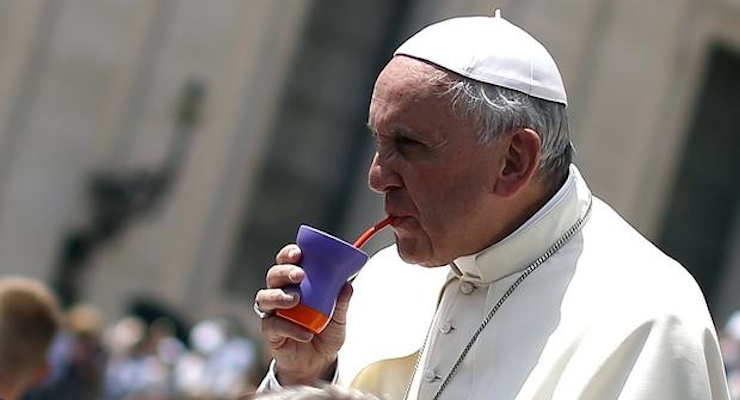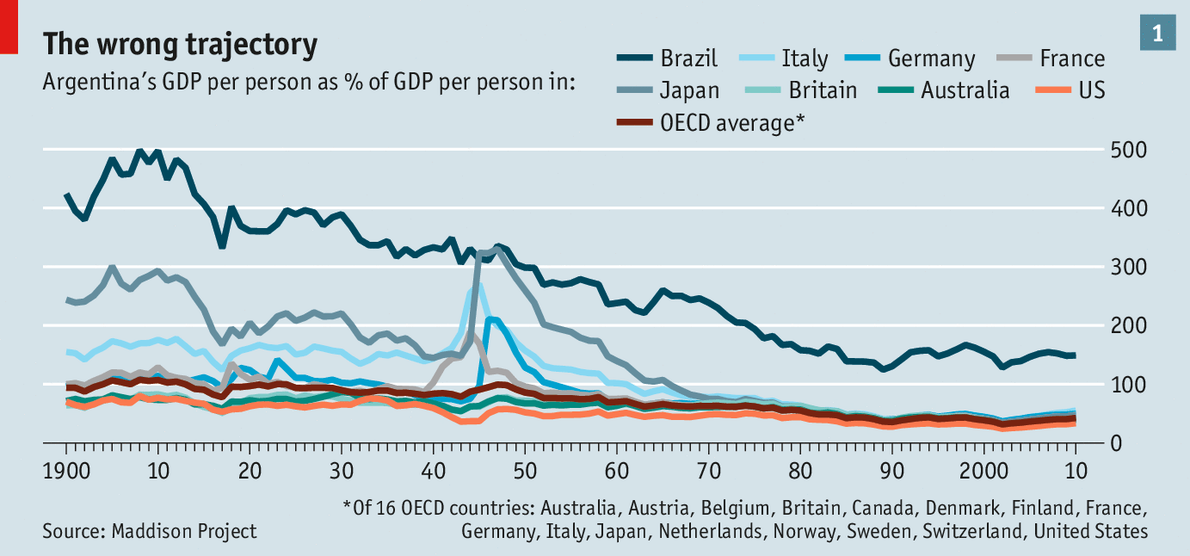

Pope Francis drinks mate, an Argentinian drink, during his weekly general audience at St. Peter’s Square at the Vatican, June 18, 2014. (Photo: AP)
What’s the greatest economic tragedy in modern history? The obvious answer is communism, which produced tens of millions of needless deaths and untold misery for ordinary people. Just compare living standards in North Korea and South Korea, or Chile and Cuba.
But if there was a second-place prize for the world’s biggest economic failure, Argentina would be a strong contender. Here’s one fact that tells you everything you need to know. In 1946, when Juan Perón came to power, Argentina was one of the 10-richest nations in the world. Economic policy certainly wasn’t perfect, but government wasn’t overly large are markets generally were allowed to function. Combined with an abundance of natural resources, that enabled considerable prosperity.

But Perón decided to conduct an experiment in statism. Here’s how Wikipedia describes his economic policy.
Campaigning among workers with promises of land, higher wages, and social security, he won a decisive victory in the 1946 presidential elections. Under Perón, the number of unionized workers expanded as he helped to establish the powerful General Confederation of Labor.Perón turned Argentina into a corporatist country in which powerful organized interest groups negotiated for positions and resources. …The state’s role in the economy increased, reflected in the increase in state-owned property, interventionism (including control of rents and prices) and higher levels of public inversion, mainly financed by the inflationary tax. The expansive macroeconomic policy, which aimed at the redistribution of wealth and the increase of spending to finance populist policies, led to inflation. …Perón erected a system of almost complete protection against imports, largely cutting off Argentina from the international market. In 1947, he announced his first Five-Year Plan based on growth of nationalized industries.
So were these policies successful? Not exactly. In an article published last year, The Economist wrote about Argentina’s sad decline.
…its standing as one of the world’s most vibrant economies is a distant memory… Its income per head is now 43% of those same 16 rich economies… After the second world war, when the rich world began its slow return to free trade with the negotiation of the General Agreement on Tariffs and Trade in 1947, Argentina had become a more closed economy—and it kept moving in that direction under Perón. An institution to control foreign trade was created in 1946; an existing policy of import substitution deepened; the share of trade as a percentage of GDP continued to fall. …As the urban, working-class population swelled, so did the constituency susceptible to Perón’s promise to support industry and strengthen workers’ rights. There have been periods of liberalisation since, but interventionism retains its allure.
The bottom line is that Perón was a disaster for his nation. Not only did he sabotage Argentina’s economy, he also apparently undermined the social capital of the country by somehow convincing a big chunk of the population that “Peronism” is an alluring economic philosophy.
Sadly, Pope Francis appears to be one of those people.
Here are some excerpts from a column in the New York Times.
The Economist recently called Francis “the Peronist Pope,” referring to his known sympathies for Argentina’s three-time president, Juan Perón. In the 1940s and ’50s, the populist general upended Argentina’s class structure by championing the country’s downtrodden. …“Neither Marxists nor Capitalists. Peronists!” was the chant of Perón’s supporters. And it was borrowing from the church’s political thinking that enabled Perón to found his “Third Way.” …It comes naturally, then, to Francis, who became a priest in Argentina’s politically engaged church hierarchy, to adopt a populist political tone… He speaks directly to the region’s poor with a fire found in the “liberation theology” that inspired South America’s leftist revolutionaries of the 1970s. …“If you were to read one of the sermons of the first fathers of the church, from the second or third centuries, about how you should treat the poor, you’d say it was Maoist or Trotskyist,” he said in 2010, when he was archbishop of Buenos Aires.
Pope Francis’ infatuation with statism is very unfortunate for a couple of reasons.
The obvious reason is that he is in a position of influence and he’s using that power to promote policies that will reduce prosperity. And poor people will be the biggest victims, as I explained in this BBC interview.
But there’s another problem with the Pope’s approach. Being charitable to the poor is supposed to be an act of free will, not the result of government coercion. Yet by making statements that – at the very least – are interpreted as supportive of a bigger welfare state, he’s taking free will out of the equation.
“Libertarian Jesus” would not approve.
[mybooktable book=”global-tax-revolution-the-rise-of-tax-competition-and-the-battle-to-defend-it” display=”summary” buybutton_shadowbox=”true”]






